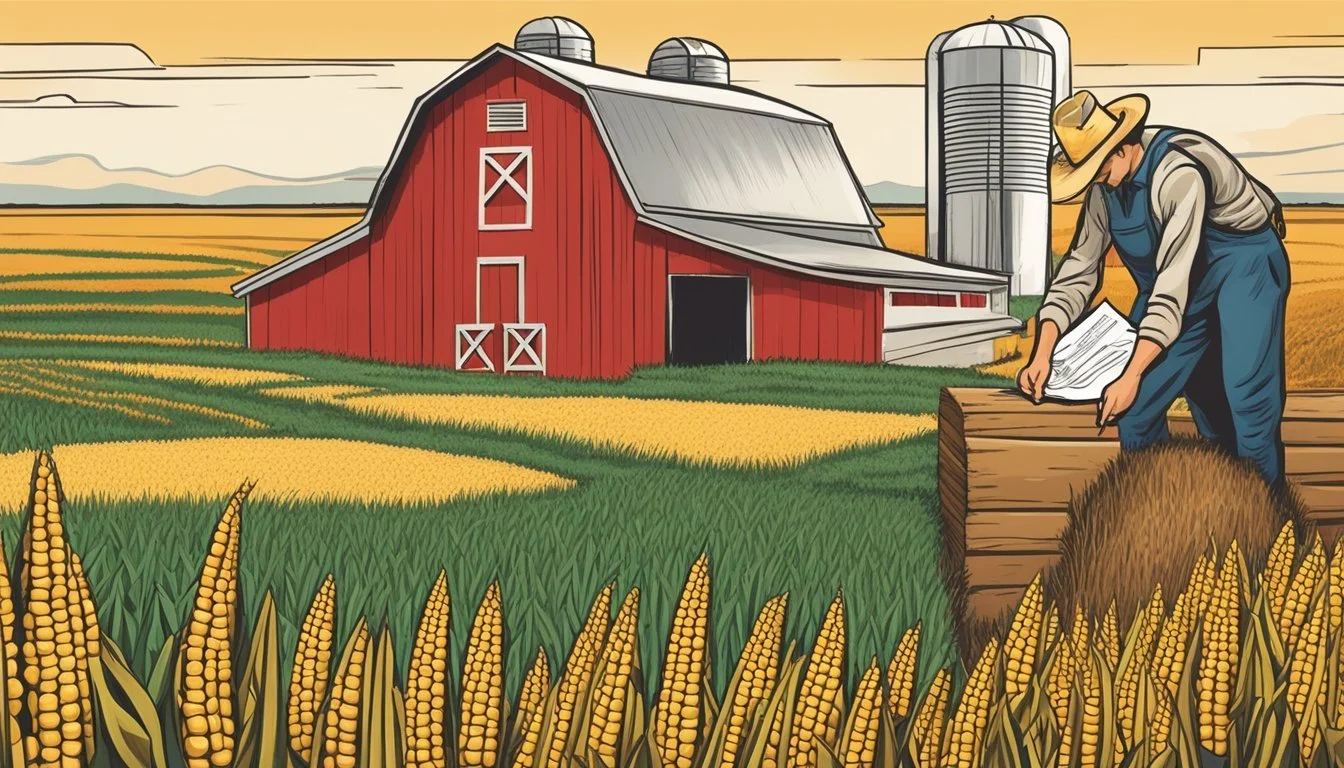Farm Loans in Nebraska
Navigating Financial Options for Agricultural Success
This Article is Part of Our Guide on Farm Loans for All 50 U.S. States
Farm loans are pivotal in supporting Nebraska's agricultural industry, where both experienced and incoming farmers and ranchers seek financial assistance to manage and grow their operations. These loans are designed to cater to various needs, including purchasing land, investing in equipment, and covering operational expenses. In Nebraska, a state where agriculture comprises a significant part of the economy, accessing these loans is often essential for maintaining the vitality of rural communities and ensuring the sustainability of the farming sector.
To address the specific needs of farmers and ranchers, Nebraska offers a range of loan programs. These programs not only benefit established agriculturalists but also target minority and women farmers, as well as those just beginning their farming journey. The USDA Farm Service Agency, for instance, provides Microloans and Direct Farm Ownership Down Payment Loans with a cap, established to assist with ownership and operating costs. Moreover, the Nebraska Investment Finance Authority (NIFA) has initiatives like the Beginning Farmer/Rancher Loan Program to help new entrants to the field secure financial backing with favorable interest rates compared to conventional credit markets.
Additionally, local financial institutions such as FirstBank of Nebraska play a crucial role in supporting the state's agricultural framework. With a deep understanding of the agricultural industry's volatility and the unique challenges it presents, these entities offer specialized ag and farm loans. Expertise in ag lending enables these institutions to offer products that align with the dynamic needs of Nebraska's farmers and ranchers, further solidifying the backbone of the region's economy.
Understanding Farm Loans in Nebraska
In Nebraska, farm loans are critical tools for farmers and ranchers to acquire land, purchase equipment, and sustain operations. Understanding the options and key players involved in agricultural finance can set the groundwork for successful loan management.
Types of Farm Loans Available
Nebraska offers a variety of farm loans tailored to meet the needs of its agricultural community. Loans can be categorized based on their purpose:
Operating Loans: Used for day-to-day expenses.
Ownership Loans: Aimed at purchasing farmland or ranches.
Equipment Loans: For buying new or used farm equipment.
The USDA Farm Service Agency (FSA) provides several loan programs, including those targeted at beginners with the aim to support the next generation of farmers. NIFA's Beginning Farmer/Rancher Loan Program supports eligible individuals with lower interest rates, addressing financial barriers in starting or expanding an operation.
The Role of Lenders in Farm Financing
Lenders play a pivotal role in Nebraska's farm financing landscape. They include:
Government Agencies: The USDA FSA is a primary example of a government agency offering direct loans and guarantees.
State Programs: Nebraska Investment Finance Authority (NIFA) facilitates affordable loans for beginners.
Private Lenders: Banks and credit institutions such as Farm Credit Services of America offer diverse financing options.
The cooperation between these lenders allows Nebraska farmers and ranchers to navigate through different financial products and find one that matches their needs.
Important Loan Terminology
A clear understanding of loan terminology is essential when navigating farm loans:
Principal: The amount of money borrowed.
Interest: The cost of borrowing, typically expressed as a percentage.
Term: The length of time over which the loan is repaid.
For example, the USDA FSA stipulates a maximum loan amount of 45 percent of the lesser of the property's purchase price, appraised value, or $667,000. This results in a maximum loan amount of $300,150, to be repaid over a 20-year term. Understanding these terms ensures farmers and ranchers can plan their finances accurately.
Loan Programs and Resources for Nebraska Farmers
Nebraska farmers have several loan programs and resources available to them, ranging from federal to state-level options. These programs are designed to support the purchase and operation of farm and ranch properties, offering competitive terms to aid in the long-term success of agricultural enterprises.
USDA Farm Loan Programs
The USDA Farm Service Agency offers various loan programs for farmers in Nebraska. One such program stipulates that the maximum loan amount cannot exceed 45 percent of the lesser of the farm's purchase price, appraised value, or $667,000, resulting in a maximum loan amount of $300,150. The terms of these loans extend up to 20 years, accommodating long-term agricultural investments.
Nebraska Investment Finance Authority (NIFA)
NIFA provides lending solutions tailored to individuals starting or expanding farming or ranching operations in Nebraska. They offer agriculture-focused loan programs with terms designed to be more appealing than conventional farm credit markets.
Beginning Farmer/Rancher Loan Program
The Beginning Farmer/Rancher Loan Program is part of NIFA's efforts, aimed at helping new entrants in the agriculture sector. The program extends loans with reduced interest rates, enabling beginning farmers and ranchers to establish and grow their operations in a financially sustainable way.
Farm Service Agency (FSA) Loans
Beyond the typical USDA loan programs, the Farm Service Agency has additional offerings. FSA provides loans to farmers and ranchers who are unable to obtain commercial credit, with options including operating loans for livestock and equipment, and farm ownership loans.
State and Local Agricultural Loan Programs
Several state and local programs such as the NextGen Beginning Farmer Program offer additional support for Nebraska's agriculture sector. These programs often have a unique set of benefits, including potential tax incentives and specialized assistance for new farmers. The Nebraska Rural Response Hotline, via farmhotline.com, provides a valued resource for those in the rural community seeking advice or assistance related to agricultural operations.
Qualifying for Farm Loans
In Nebraska, farmers and ranchers looking to qualify for farm loans must meet specific eligibility requirements, understand the credit prerequisites, and prepare the necessary documentation.
Eligibility Requirements
Eligibility for farm loans is determined by several key factors. To start, entities such as the USDA Farm Service Agency set certain criteria that must be satisfied. Applicants typically must:
Be a farmer or rancher intending to buy or operate a family-sized farm.
Not exceed a certain net worth threshold, demonstrating the need for financial support.
Lack sufficient farm credit available from other commercial lenders.
Have sufficient experience or show evidence of educational training in agriculture to ensure successful farming operations.
Understanding Credit Requirements
Creditworthiness is crucial for securing a farm loan. Lenders assess a borrower's credit history to judge their ability to repay the loan. Key credit requirements include:
A reliable history of meeting financial obligations.
A credit score that meets the agency's minimum standards.
A history of generating farm income, though this may differ for beginning farmers.
Preparing Necessary Documentation
Thorough and accurate documentation is essential for a smooth loan application process. Farmers should prepare:
Financial statements that include a balance sheet, income statement, and cash flow projection.
Evidence of experience in farming or agriculture-related education.
Prospective borrowers should also ensure they have any specific documents required by the loan program, such as property appraisals for purchase loans, or business plans for operating loans.
Financial Management and Planning
Effective financial management and planning are crucial to operating a successful farm. They must grasp their financial health, manage operating expenses wisely, and develop clear investment strategies to sustain and grow their agribusiness.
Assessing Farm Financial Health
A farm’s financial health can be gauged through several key indicators:
Liquidity: Having sufficient cash flow to meet short-term obligations.
Solvency: The ability to cover all debts should the farm need to liquidate.
Profitability: Ensuring that revenues exceed the costs of operation.
Farmers can use tools such as balance sheets, income statements, and cash flow statements to accurately assess these areas.
Managing Operating Expenses
Operating expenses in farming can range from seed and fertilizer costs to machinery maintenance. They must be carefully controlled through:
Budgeting: Planning for both expected and unforeseen costs.
Effective Procurement: Negotiating better prices and choosing quality supplies to ensure cost-efficiency.
Reducing waste, optimizing resource use, and regularly reviewing expenses against the budget are key practices in managing operating costs.
Investment Strategies in Agriculture
Investment strategies for farmers in Nebraska involve:
Diversification: Investing in a mix of crops or livestock to spread risk.
Capital Assets: Acquiring land or equipment that will increase in value or produce income.
Utilizing agricultural loans to finance these investments can offer an entry or expansion point into the market, as long as the investments are expected to generate returns that outweigh the costs of financing.
Loan Terms and Repayment Options
The terms of farm loans in Nebraska, including interest rates and repayment options, are crucial for prospective borrowers to understand. Different loans may provide varying terms based on the financial product offered by the lender.
Interest Rates and How They Affect Loans
Interest rates have a significant impact on the total cost of a loan. Agricultural loans in Nebraska can come with fixed or variable interest rates. A fixed rate ensures consistent monthly payments, while a variable rate can fluctuate with market conditions, affecting the repayment amount. Farm loan officers play a key role in helping borrowers understand the implications of each rate type.
Understanding Repayment Schedules
Repayment schedules detail when and how often loan payments must be made. Generally, farm loans offer flexible repayment terms tailored to the operation's cash flow, which can include:
Seasonal repayment schedules
Annual or semi-annual payments
Standard monthly payments
Aspects such as the loan's principal, interest accrued, and the loan's term length dictate the structure of these repayment schedules. Borrowers must work with loan officers to establish a schedule that aligns with their financial capabilities.
Strategies for Distressed Borrowers
For distressed borrowers, having a plan in place to manage loan repayments is essential. Strategies can include:
Refinancing to secure a lower interest rate or more favorable terms
Loan restructuring which may involve extending the loan term
Seeking loan deferral options for temporary relief
It's imperative that distressed borrowers communicate proactively with their loan officers to explore available solutions. Early intervention can lead to more manageable payment arrangements and avoid more severe financial consequences.
Additional Support and Opportunities
In Nebraska, agricultural producers have access to a variety of resources and programs that support their continuous growth and involvement in the sector. These opportunities range from educational resources to community partnerships and are pivotal for both the advancement of agricultural techniques and the enhancement of market opportunities.
Educational Resources for Ag Producers
Nebraska presents extensive educational resources available to agricultural producers. These resources are designed to provide them with knowledge and skillsets necessary for successful farming. The Nebraska Investment Finance Authority (NIFA), for example, offers educational components as part of its Beginning Farmer and Rancher Loan Program. These components are crucial for new entrants in agriculture, ensuring they are well-prepared to manage their operations effectively.
Partnerships and Community Involvement
Community involvement through partnerships is a key factor for the success of agricultural producers in Nebraska. Organizations such as the USDA Farm Service Agency (FSA) and Farm Credit Services of America (FCSA) work closely with farmers to offer financial guidance and support. These partnerships often extend to ag youth, fostering a new generation of farmers equipped with the knowledge and tools necessary to sustain and innovate within the industry.
Agricultural Events and News
Keeping up to date with the latest agricultural events and news is vital for producers to stay informed of market trends and new technologies. Nebraska's agricultural community benefits from events that promote networking and knowledge sharing. Regular news updates are provided through various channels, ensuring that farmers and ranchers are always aware of fresh opportunities and important legislative changes that may affect their operations.
Contact and Assistance
Navigating the intricacies of farm loans in Nebraska requires reliable contacts and informed assistance. It’s crucial for farmers to have direct communication with knowledgeable loan officers, engage with institutions that offer farm-related financial services, and understand the roles of various government agencies involved in agricultural financing.
Reaching Out to Loan Officers
Farmers seeking financial guidance can connect with loan officers specializing in agricultural loans. These professionals provide essential information on loan types, eligibility, terms, and application processes. For personal assistance, farmers can use resources such as the Nebraska Farm Service Agency (FSA) or contact the Rural Response Hotline at 800-464-0258 for expert financial advice.
Lenders and Participating Institutions
Several institutions in Nebraska offer farm loans with competitive terms. Key players include:
Farm Credit Services of America (FCSA): Offers loans and financial services tailored to the agricultural sector.
Nebraska Investment Finance Authority (NIFA): Provides the Beginning Farmer/Rancher Loan Program among other services.
NextGen Nebraska: Offers programs for younger agricultural entrepreneurs.
These lenders and others participate in state-supported programs, ensuring comprehensive financial solutions for farmers.
Government Agencies and Their Roles
Government agencies play pivotal roles in agricultural financing:
USDA Farm Service Agency (FSA): They run programs supporting minority, women farmers, and beginning farmers, and help facilitate the transfer of land through programs such as the Direct Farm Ownership Down Payment Loan.
Nebraska Department of Revenue (NDR): Offers information on tax incentives for beginning farmers.
The staff at these agencies can assist farmers in identifying suitable loan programs and navigating the application process.






